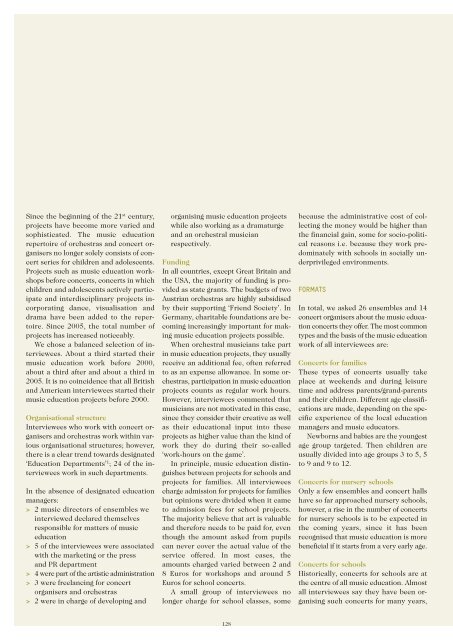exchange die kunst, musik zu vermitteln - Kunstdervermittlung.at
exchange die kunst, musik zu vermitteln - Kunstdervermittlung.at
exchange die kunst, musik zu vermitteln - Kunstdervermittlung.at
Sie wollen auch ein ePaper? Erhöhen Sie die Reichweite Ihrer Titel.
YUMPU macht aus Druck-PDFs automatisch weboptimierte ePaper, die Google liebt.
Since the beginning of the 21 st century,<br />
projects have become more varied and<br />
sophistic<strong>at</strong>ed. The music educ<strong>at</strong>ion<br />
repertoire of orchestras and concert organisers<br />
no longer solely consists of concert<br />
series for children and adolescents.<br />
Projects such as music educ<strong>at</strong>ion workshops<br />
before concerts, concerts in which<br />
children and adolescents actively particip<strong>at</strong>e<br />
and interdisciplinary projects incorpor<strong>at</strong>ing<br />
dance, visualis<strong>at</strong>ion and<br />
drama have been added to the repertoire.<br />
Since 2005, the total number of<br />
projects has increased noticeably.<br />
We chose a balanced selection of interviewees.<br />
About a third started their<br />
music educ<strong>at</strong>ion work before 2000,<br />
about a third after and about a third in<br />
2005. It is no coincidence th<strong>at</strong> all British<br />
and American interviewees started their<br />
music educ<strong>at</strong>ion projects before 2000.<br />
Organis<strong>at</strong>ional structure<br />
Interviewees who work with concert organisers<br />
and orchestras work within various<br />
organis<strong>at</strong>ional structures; however,<br />
there is a clear trend towards design<strong>at</strong>ed<br />
‘Educ<strong>at</strong>ion Departments’ 1 ; 24 of the interviewees<br />
work in such departments.<br />
In the absence of design<strong>at</strong>ed educ<strong>at</strong>ion<br />
managers:<br />
> 2 music directors of ensembles we<br />
interviewed declared themselves<br />
responsible for m<strong>at</strong>ters of music<br />
educ<strong>at</strong>ion<br />
> 5 of the interviewees were associ<strong>at</strong>ed<br />
with the marketing or the press<br />
and PR department<br />
> 4 were part of the artistic administr<strong>at</strong>ion<br />
> 3 were freelancing for concert<br />
organisers and orchestras<br />
> 2 were in charge of developing and<br />
organising music educ<strong>at</strong>ion projects<br />
while also working as a dram<strong>at</strong>urge<br />
and an orchestral musician<br />
respectively.<br />
Funding<br />
In all countries, except Gre<strong>at</strong> Britain and<br />
the USA, the majority of funding is provided<br />
as st<strong>at</strong>e grants. The budgets of two<br />
Austrian orchestras are highly subsi dised<br />
by their supporting ‘Friend Society’. In<br />
Germany, charitable found<strong>at</strong>ions are becoming<br />
increasingly important for making<br />
music educ<strong>at</strong>ion projects possible.<br />
When orchestral musicians take part<br />
in music educ<strong>at</strong>ion projects, they usually<br />
receive an additional fee, often referred<br />
to as an expense allowance. In some orchestras,<br />
particip<strong>at</strong>ion in music educ<strong>at</strong>ion<br />
projects counts as regular work hours.<br />
However, interviewees commented th<strong>at</strong><br />
musicians are not motiv<strong>at</strong>ed in this case,<br />
since they consider their cre<strong>at</strong>ive as well<br />
as their educ<strong>at</strong>ional input into these<br />
projects as higher value than the kind of<br />
work they do during their so-called<br />
‘work-hours on the game’.<br />
In principle, music educ<strong>at</strong>ion distinguishes<br />
between projects for schools and<br />
projects for families. All interviewees<br />
charge admission for projects for families<br />
but opinions were divided when it came<br />
to admission fees for school projects.<br />
The majority believe th<strong>at</strong> art is valuable<br />
and therefore needs to be paid for, even<br />
though the amount asked from pupils<br />
can never cover the actual value of the<br />
service offered. In most cases, the<br />
amounts charged varied between 2 and<br />
8 Euros for workshops and around 5<br />
Euros for school concerts.<br />
A small group of interviewees no<br />
longer charge for school classes, some<br />
128<br />
because the administr<strong>at</strong>ive cost of collecting<br />
the money would be higher than<br />
the financial gain, some for socio-political<br />
reasons i.e. because they work predomin<strong>at</strong>ely<br />
with schools in socially underprivileged<br />
environments.<br />
FORMATS<br />
In total, we asked 26 ensembles and 14<br />
concert organisers about the music educ<strong>at</strong>ion<br />
concerts they offer. The most common<br />
types and the basis of the music educ<strong>at</strong>ion<br />
work of all interviewees are:<br />
Concerts for families<br />
These types of concerts usually take<br />
place <strong>at</strong> weekends and during leisure<br />
time and address parents/grand-parents<br />
and their children. Different age classific<strong>at</strong>ions<br />
are made, depending on the specific<br />
experience of the local educ<strong>at</strong>ion<br />
managers and music educ<strong>at</strong>ors.<br />
Newborns and babies are the youngest<br />
age group targeted. Then children are<br />
usually divided into age groups 3 to 5, 5<br />
to 9 and 9 to 12.<br />
Concerts for nursery schools<br />
Only a few ensembles and concert halls<br />
have so far approached nursery schools,<br />
however, a rise in the number of concerts<br />
for nursery schools is to be expected in<br />
the coming years, since it has been<br />
recognised th<strong>at</strong> music educ<strong>at</strong>ion is more<br />
beneficial if it starts from a very early age.<br />
Concerts for schools<br />
Historically, concerts for schools are <strong>at</strong><br />
the centre of all music educ<strong>at</strong>ion. Almost<br />
all interviewees say they have been organising<br />
such concerts for many years,


